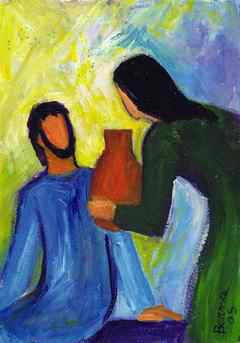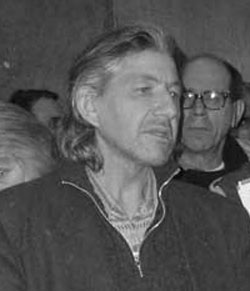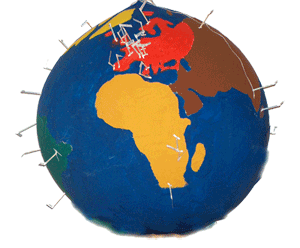|









|
|
- Worship in Spirit and
in Truth
A woman (a Samaritan) said to Jesus: "Master,
I see that you are a prophet…our fathers worshiped in this
mountain, and you, the Jews, you say: it is in Jerusalem that
we should worship". Jesus said to her:" Believe me,
woman, the time has come when it is not any more in this mountain
neither in Jerusalem that we should worship the Father […]
but the time comes, and it is now, when the true worshipers will
worship the Father in spirit and in truth, because they are those
worshipers that the Father seeks. God is a Spirit and those who
worship him must worship him in spirit and in truth."
(John 4, 19-25)
-

|
The dialogue of Jesus with this Samaritan near the Jacob's
well has a far-reaching theological meaning. It is worth to think
about this above reported dialogue. |
-
- This woman discerned in Jesus an exceptional person and
she took advantage by asking some of her own unanswered questions:
"Where should we worship God?" Like us she is looking
for reference marks and did not want to make a mistake. Where
is God? Where can we find him for worship? In Jerusalem or in
the Mount Garizim? Jesus completely changed the question. He
put back to back the Jewish and the Samaritan reference marks.
One cannot assign a territory to God; he is of another nature,
a spiritual nature.
-

|
All along his teaching, Jesus told us where to find God. He
can be found in our neighbour. |
-
- It is the way to worship God, in a genuine way. God is
not only in one place but he is with those who are in need and
hope for help. God is there, in spirit and in truth, where he
can be worshiped. These new reference marks give us freedom from
a too close link with God in a specific location. They avoid
the risk to freeze our image of God into an abstract, out of
time and unchanging image. This does not mean that it is easy
to define these new reference marks.
We attribute today to our society and to our youth a lack of
reference marks that are at the root of all problems: violence,
drugs, suicide… But what reference marks are missing? Commands
from somewhere else, accompanied by sanctions are no longer followed.
Fear or making us feel guilty cannot last.
-
|
Codes of ethic considered as evident, as natural are now questioned:
they don't follow enough the cultural evolution of the societies
and the individuals, and they are not adapted to multiple behaviours.
How to operate a fair choice? |

|
-
- There is the temptation to look in the past for reference
marks when God's image and authority were better established.
But we cannot apply today some thing that was working yesterday.
From a stable and less complex society we have moved into a mobile
and complicated world. It is destabilizing but also what a range
of new possibilities! There are no more roads to follow but new
choices have become possible with more freedom, in an authentic
way. The supreme reference mark is still there: " Love each
other as I loved you",. It is the evangelical transcription
of the taboo of homicide at the basis of all societies: "
You shall not kill".
Is it clear enough? The good for the other is not always easy
to discern. Ethical discussions such as euthanasia, abortion,
cloning, immigration, economy, and environment show how it is
difficult to make a decision. Good and bad, human and inhuman,
cannot so simply be distinguished. They are intermixed some time
so much they are impossible to clarify. The reference marks for
making a choice on complex situations are not given for once
and are not coming from a superior authority: they have to be
temporarily set up, case by case. Their validity relies on their
relevance to a specific field, for a given time and culture.
Do the reference marks allow to progress? Do they open the future?
Do they give happyness?

|
Instability, precariousness, flexibility and permanent questioning
characterize our post-modern world. We have to surf on this moving
ocean, eventually to dive into it without being engulfed. |
-
- Faith is really a way to go without being secure, "in
spirit and in truth". Faith starts when there is no more
reference marks, no more roads to follow, faith pushes you to
still go on without firm ground, ready to jump without knowing
where we are going to land, possibly nowhere. Sometimes, in a
subtle way, we experience no solid ground but we don't fall.
It is the expression in some one's eyes, reflecting the light
of God, that makes us feel more surely guided.
|
